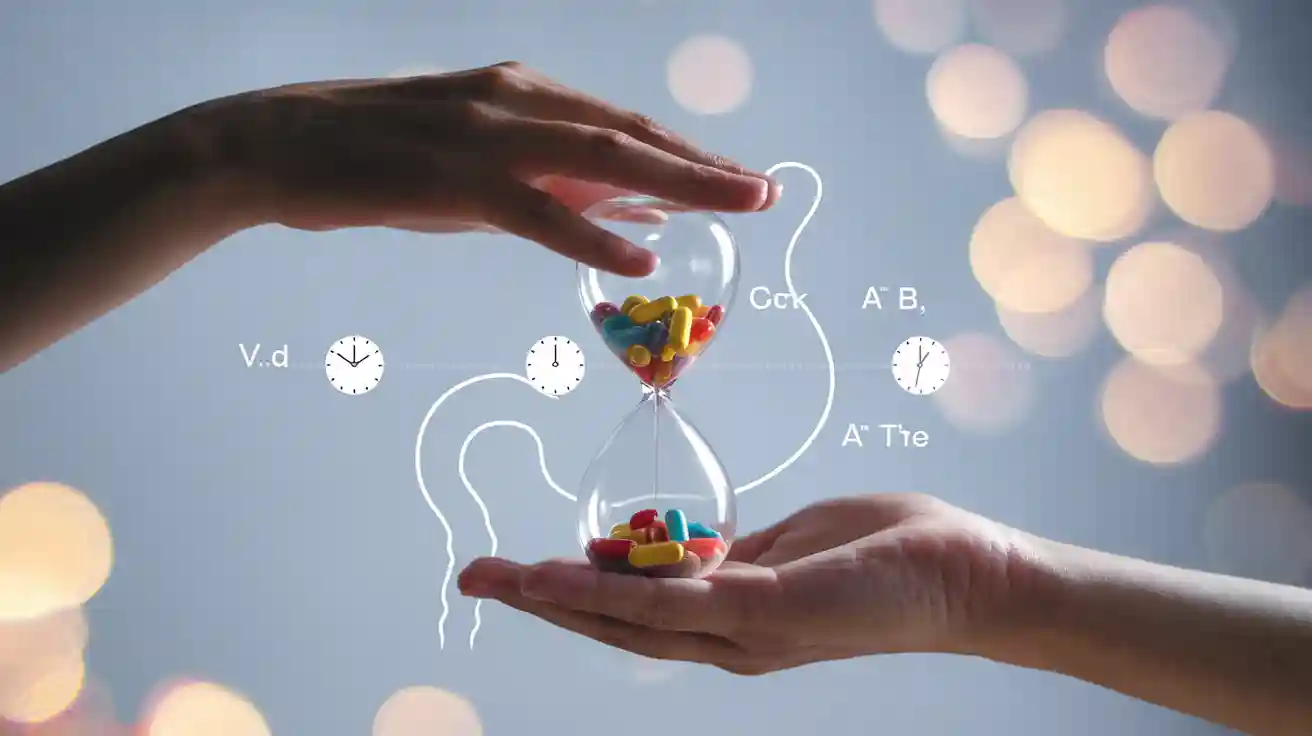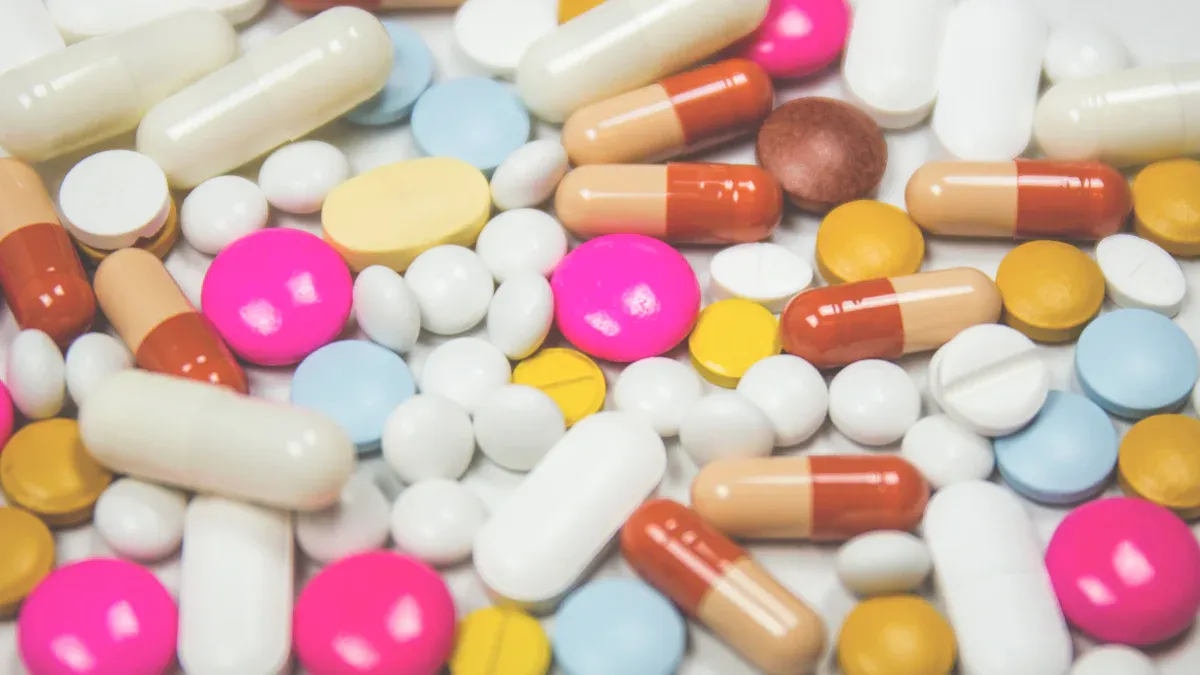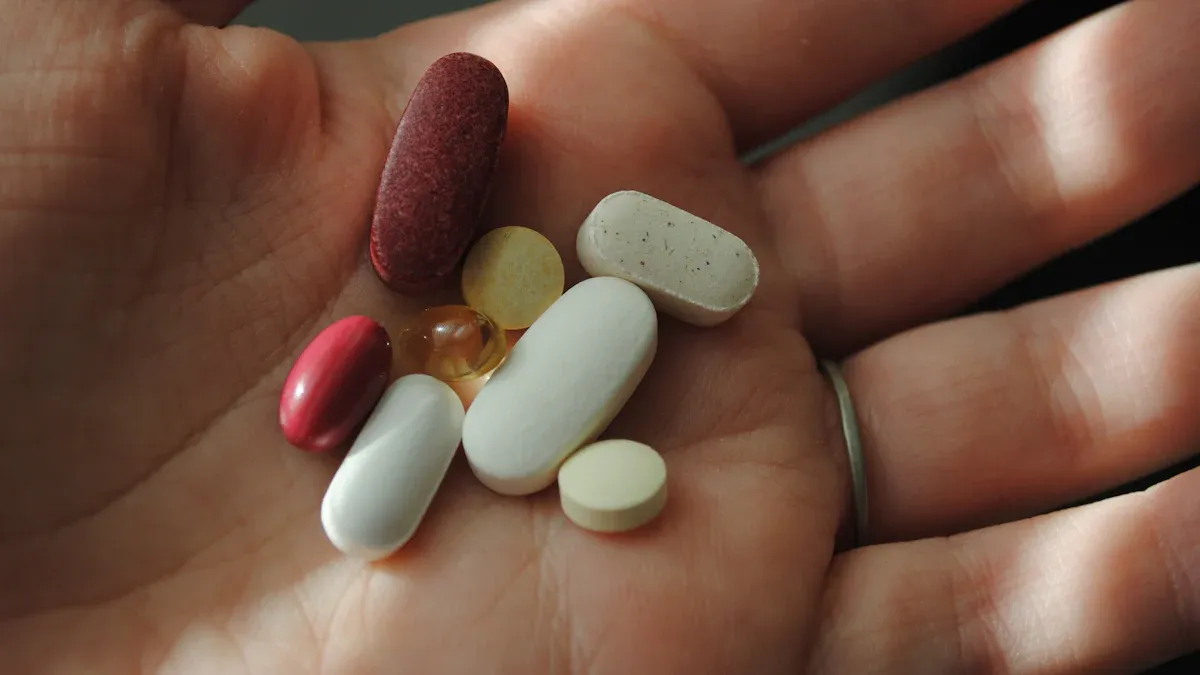Digest Vitamins and the Time Needed for Absorption
Table of Contents

When you digest vitamins, the absorption process usually starts within minutes and can last up to a few hours, depending on the type of vitamin and your body. Your digestion and the digestive process play a big role in how quickly your body uses these nutrients.
- Absorption efficiency changes with factors like vitamin type, age, and health conditions.
- For example, vitamin C shows higher absorption at lower doses, while vitamin D absorption depends on digestion, food, and individual metabolism.
Knowing how your body digests vitamins helps you get the most from your supplements and supports your health.
Digest Vitamins: Absorption Time
How Long It Takes
When you digest vitamins, the process begins as soon as you take them by mouth. The digestive process starts in your mouth, where chewing and saliva help break down food and supplements. After you swallow, the vitamins move quickly through your esophagus and into your stomach. Here, your stomach churns and mixes the contents with gastric juices, turning them into a thick liquid called chyme. This stage of digestion can last a few hours, especially if your meal contains a lot of fat or protein.
The real action for vitamin absorption happens after this. Once the chyme enters your small intestine, your body uses enzymes and bile to break down nutrients even further. The small intestine is where most nutrient absorption takes place, including vitamins. Food and supplements usually spend about three to six hours in the small intestine. This transit time directly affects how quickly your body can absorb vitamins.
Tip: The timelines of digestion can change based on what you eat. Meals with more fat or protein slow down digestion times, which can delay the absorption of certain vitamins.
Clinical research shows that the timeframe for oral intake of vitamins varies. For example, vitamin A can be absorbed and distributed in your body within 24 hours. Vitamin D3 reaches its peak absorption about 12 hours after you take it, especially if you eat a meal with some fat. Vitamin B12 has a unique pattern, with a late absorption peak that can happen almost nine hours after oral intake. These differences show that the time it takes to digest vitamins and absorb them can range from minutes to several hours, or even up to a day.
Where Absorption Happens
Your small intestine is the main site for vitamin absorption. This part of your digestive tract has special structures called villi and microvilli. These tiny, finger-like projections increase the surface area, making it easier for your body to absorb nutrients from digested food.
- The terminal ileum, which is the last part of your small intestine, absorbs vitamin B12 that is bound to a special protein called intrinsic factor.
- The duodenum and upper jejunum, which are the first sections of your small intestine, absorb minerals like iron and calcium. These minerals often work together with vitamins for better nutrient absorption.
- Fat-soluble vitamins, such as A, D, E, and K, are absorbed along with fats in the small intestine. Water-soluble vitamins, like vitamin C and the B vitamins, move directly into your bloodstream from the small intestine.
The digestive process ensures that by the time food reaches the final digestion stage, your body has already absorbed most of the vitamins. The presence of food, especially fat, can help your body absorb fat-soluble vitamins more efficiently. In contrast, water-soluble vitamins do not depend as much on food and can be absorbed whether you eat or not.
Note: The transit time through your small intestine, which is about three to six hours, plays a key role in how well you digest vitamins and how much your body can use from each oral intake.
Understanding how your body digests vitamins and where absorption happens helps you make better choices about when and how to take your supplements. This knowledge can improve the effectiveness of your vitamin absorption and support your overall health.
Fat-Soluble vs. Water-Soluble Vitamins

Absorption Differences
You need to know how your body handles different types of vitamins. Fat-soluble vitamins include A, D, E, and K. These vitamins need dietary fats for proper digestion and absorption. Water-soluble vitamins, like vitamin C and the B vitamins, do not need fats. Your body absorbs them directly into the bloodstream from the small intestine.
- Water-soluble vitamins move into your bloodstream through passive diffusion or active transport. They do not need carriers or emulsifiers because they mix well with water.
- Fat-soluble vitamins require a more complex process. They must join with fats and form tiny droplets called micelles. Your body then absorbs these vitamins into intestinal cells, packages them into chylomicrons, and sends them through the lymphatic system before they reach your bloodstream.
- If you have trouble digesting fats, your body may not absorb enough fat-soluble vitamins. Water-soluble vitamins do not have this problem.
Fat digestion takes longer than the digestion of proteins or carbohydrates. Mayo Clinic research shows that fat digestion can take over a day. This slow process means your body absorbs fat-soluble vitamins over a longer period. Efficient fat digestion helps you maintain healthy levels of essential vitamins.
Role of Bile and Enzymes
Bile and enzymes play a big part in the absorption of fat-soluble vitamins. Bile salts, made in your liver, act like soap. They break up large fat droplets into smaller ones, making it easier for enzymes to work. These bile salts help form micelles, which carry fat-soluble vitamins to the intestinal wall.
Biochemical studies show that without enough bile salts, your body cannot make enough micelles. This leads to poor absorption of fat-soluble vitamins and can cause deficiencies. Enzymes from your pancreas also help by breaking down fats into smaller parts. When bile and enzymes work together, they increase the bioavailability of these vitamins. This means your body can use them more easily. Water-soluble vitamins do not need bile or fat breakdown. They enter your bloodstream quickly after digestion.
Tip: Eating meals with healthy fats can boost the bioavailability of fat-soluble vitamins. This helps your body get the most from these nutrients.
Vitamin Absorption Factors
Food and Meal Timing
Your digestion plays a big role in how your body absorbs vitamins. The timing of your meals can change how much of each vitamin you get from your food or vitamin supplements. If you take vitamins E and C before breakfast, you may see higher levels in your blood before dinner. However, vitamin C levels can drop after meals when taken early in the day. Taking vitamins E and C before supper helps keep higher levels in your body through the evening and can lower inflammation after eating. For vitamin D, eating a meal with fat increases absorption by over 30% compared to a fat-free meal. The type of fat does not matter as much as having some fat present. The physical state of your food also affects digestion times and absorption. Carotenoids in fibrous foods do not absorb as well as vitamin A from other sources. The complexity of your diet, including vitamin interactions, can change how well your body absorbs each vitamin.
Tip: Try to take fat-soluble vitamins with meals that contain healthy fats for better absorption.
Metabolism and Digestive Health
Your metabolism and digestive health influence vitamin absorption. The way your body breaks down food and uses nutrients depends on your age, stress, and health status. For example, older adults may have slower digestion and lower absorption of vitamins like B12 and folate. Your gut microbiome helps with nutrient absorption and supports your immune system. Good digestive health means your body can absorb vitamins more easily. B-vitamins help keep your gut barrier strong and support healthy bacteria. Vitamins A, D, and C also help your gut stay healthy and improve bioavailability. If your gut is not healthy, you may not absorb enough vitamins, even if you eat a balanced diet.
Supplement Form
The form of your vitamin supplements affects how quickly your body absorbs them. Liquid vitamins start absorption faster because they are already dissolved. Pills and tablets need to break down in your digestive system, which slows absorption. Capsules break down faster than hard tablets but still take longer than liquids. Additives and coatings on tablets can lower absorption efficiency. Liquids offer higher bioavailability and work well for people who need quick results or have trouble swallowing pills. Pills may be better if you want slower absorption or need longer-lasting effects. The best choice depends on your health needs and comfort.
Digestive enzymes help break down food during digestion. In healthy people, your body makes enough enzymes naturally. You do not need extra enzyme supplements for vitamin absorption unless you have a medical condition that affects enzyme production. A balanced diet supports your natural enzyme function and nutrient absorption.
Oral vs. IV Vitamins

Absorption Speed
You might wonder how fast your body absorbs vitamins from oral intake compared to intravenous (IV) delivery. When you use oral intake, vitamins must pass through your digestive system. This process takes time because your body needs to break down the vitamins before they can enter your bloodstream. Many factors, such as digestive health and the form of the supplement, affect how much your body absorbs. Usually, oral intake leads to a bioavailability of only 10% to 50%. This means your body may not use all the vitamins you swallow.
IV therapy works differently. It delivers vitamins straight into your bloodstream. This method skips the digestive system, so your body absorbs almost 100% of the vitamins right away. You feel the effects much faster. Here is a quick comparison:
- IV therapy gives immediate absorption and nearly full bioavailability.
- Oral intake requires digestion, which slows absorption and lowers bioavailability.
- IV therapy helps in urgent situations, like when you need rapid vitamin correction.
Note: Some vitamins, like vitamin C and vitamin D, show much higher levels in your body after IV therapy than after oral intake. Oral intake of vitamin E can take up to five hours to reach peak levels, while IV or special carriers work much faster.
When IV Is Used
You may need IV vitamin therapy in certain situations. Doctors often use it when you cannot get enough vitamins from oral intake. This can happen if you have trouble eating or if your body cannot absorb nutrients well. IV therapy also helps people recover from illness, intense exercise, or dehydration. Sometimes, doctors use it to treat nutrient deficiencies or side effects from medications.
Here are some common reasons for IV vitamin therapy:
- You cannot eat or absorb nutrients due to illness.
- You need to recover from dehydration after heavy exercise or alcohol use.
- You have a medical condition that causes vitamin deficiency.
- You need rapid correction of low vitamin levels.
| Aspect | Benefits | Risks and Disadvantages |
|---|---|---|
| Therapeutic Use | Achieves high nutrient levels quickly, supports recovery, and avoids digestive side effects | Infection risk, vein damage, nutrient toxicity, and high cost |
| Safety & Cost | Rapid correction of deficiencies, customizable treatments | Requires trained staff, not always covered by insurance, possible allergic reactions |
| Clinical Evidence | Effective for real deficiencies and some clinical uses | Not proven for general wellness or chronic disease prevention |
Tip: IV vitamin therapy is not for everyone. You should only use it under medical supervision. For most people, oral intake is safe and effective for daily vitamin needs.
Optimize Vitamin Absorption
Best Practices
You can maximize the absorption of vitamins by following a few simple steps. Start by taking fat-soluble vitamins, such as A, D, E, and K, with meals that contain healthy fats. Foods like avocado, olive oil, nuts, and seeds help your body dissolve and absorb these nutrients. If you use vitamin supplements, choose forms that are pre-dissolved in oils or use advanced delivery systems like MICROGEL. These options improve bioavailability and make digestion easier.
Eating a nutrient-rich diet supports a smooth digestive journey. Pairing vitamins with the right foods can boost absorption. For example, spicy foods with piperine from black pepper increase metabolism and help your body transport nutrients. You can also combine vitamin D with magnesium or turmeric with piperine for better results. Water-soluble vitamins, such as vitamin C and B12, absorb well with meals. Iron works best on an empty stomach with vitamin C-rich juice, but avoid calcium-rich foods at the same time.
Tip: Take multivitamins with food to reduce stomach upset and improve absorption of fat-soluble vitamins.
Common Mistakes
Many people make mistakes that lower the effectiveness of vitamins. One common error is taking fat-soluble vitamins on an empty stomach. Without dietary fat, your body cannot absorb these nutrients well. Another mistake is taking multivitamins without food, which can cause stomach discomfort and poor digestion.
| Mistake | Impact on Digestion and Absorption |
|---|---|
| Taking fat-soluble vitamins without fat | Poor absorption; nutrients wasted |
| Combining minerals like calcium, magnesium, and iron | Competition reduces uptake; possible stomach upset |
| Ignoring supplement-drug interactions | Reduced effectiveness or increased risk |
| Not spacing out mineral supplements | Lower absorption and more digestive issues |
You should also watch for supplement interactions with medications. For example, vitamin K can affect blood thinners, and iron can block thyroid medication. Always check with your doctor before starting new vitamin supplements. Spacing out minerals and taking them at different times helps your body absorb each one better. These steps support healthy digestion and help you get the most from your vitamins.
You now know that your body absorbs most vitamins in the small intestine. Fat-soluble vitamins need healthy fats, while water-soluble vitamins enter your blood quickly. Factors like supplement form, meal timing, and gut health all play a role.
Remember: Taking vitamins with food, spacing out minerals, and supporting your gut can boost absorption.
If you want the best results, talk to a healthcare professional. They can help you choose the right vitamins for your needs and make sure you stay healthy.
FAQ
How long does it take for vitamins to start working?
You usually feel the effects of vitamins within a few hours. Some vitamins, like B12, may take longer. Your body absorbs most vitamins in the small intestine. Eating with food can help speed up absorption.
Should you take vitamins with food or on an empty stomach?
You should take fat-soluble vitamins with food that contains healthy fats. Water-soluble vitamins work well with or without food. Taking vitamins with meals can help your body absorb them better.
Can you take all your vitamins at the same time?
You can take most vitamins together. Some minerals, like iron and calcium, compete for absorption. Space them out for best results.
Tip: Ask your doctor about the best schedule for your supplements.
What happens if you take too many vitamins?
Taking too many vitamins can cause side effects. You may feel sick or get stomach pain. Some vitamins, like A and D, can build up in your body.
| Vitamin | Possible Side Effect |
|———|———————|
| A | Headache, nausea |
| D | Weakness, confusion |
| C | Diarrhea |

Poseidon
Master of Nutritional Epidemiology, University of Copenhagen, Herbal Functional Nutrition Researcher
Focus: The scientific application of natural active ingredients such as Tongo Ali, Horny Goat Weed, and Maca to sexual health and metabolic regulation.
Core Focus:
Men: Use a combination of Tongo Ali (an energizing factor) + Maca (an energy reserve) to improve low energy and fluctuating libido.
Women: Use a combination of Horny Goat Weed (a gentle regulator) + Maca (a nutritional synergist) to alleviate low libido and hormonal imbalances.
Stressed/Middle-Aged Adults: This triple-ingredient synergy supports metabolism, physical strength, and intimacy.
Product Concept:
Based on traditional applications and modern research (e.g., Tongo Ali promotes testosterone-enhancing enzyme activity, and icariin provides gentle regulation), we preserve core active ingredients and eschew conceptual packaging—using natural ingredients to address specific needs.
Simply put: I'm a nutritionist who understands "herbal actives." I use scientifically proven ingredients like Tongo Ali, Epimedium, and Maca to help you make "sexual health" and "nutritional support" a daily routine.
